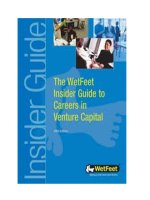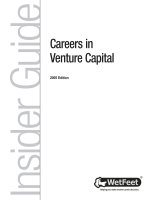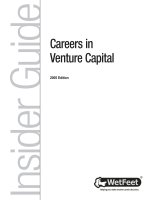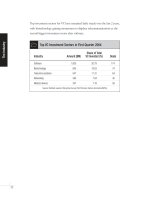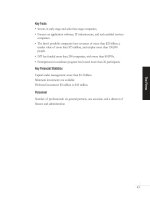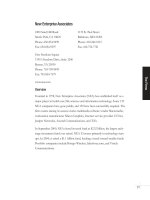Insider Guide Careers in Venture Capital PHẦN 7 doc
Bạn đang xem bản rút gọn của tài liệu. Xem và tải ngay bản đầy đủ của tài liệu tại đây (129.59 KB, 14 trang )
the technology, and the entrepreneurs. One of the most important aspects of
due diligence is uncovering the emotional and intellectual makeup of the people
in whom the venture capitalist is investing.
Doing the deals is a tricky, complicated process, but it can be learned without
too much difficulty. That’s why partners will allow up-and-coming associates to
do deals with supervision (or support, depending on your viewpoint). There are
many different ways to structure deals. Venture capitalists learn how to negotiate
things like the percentage of equity they get, antidilution clauses, and number
of board seats, with an eye toward protecting their investments and preserving
win-win propositions with their entrepreneurs.
Managing their investments is the stage where venture capitalists can sometimes
make the difference between the success and failure of a start-up. Venture capitalists
with years of experience and a stable of investments can create relationships
among companies, help start-ups find professional management, introduce
companies to large potential customers, and help companies raise further
financing. Having a John Doerr sitting on your board of directors is somewhat
akin to having a wise uncle help you along the road to a successful IPO.
87
On the Job
Key Jobs
Staffing needs and titles vary greatly from one firm to the next. Many funds
consist solely of partners and support staff. Others hire a limited number of
undergraduates and MBAs as analysts and associates with the expectation that
most will return to get their business degrees or join start-ups within a few
years. (Keep in mind that while the terms analyst and associate usually refer to
undergrads and MBAs or experienced hires, respectively, at some firms the
titles are reversed.)
General Partner
These are the people with their names on the door. General partners raise the
money for the fund and make the final decisions on which companies to invest
in. General partners, the professional members of a venture capital firm, are
usually required to contribute a small amount of their own money to their
fund. They manage the fund’s investments and generally take a 20 to 30 percent
cut of the carry from the fund. General partners are expected to provide a
wealth of business advice and industry contacts to the entrepreneurs they back.
They often sit on the boards of many companies and are deeply involved in
decisions about exit strategies—that is, when to cash out by taking the company
public or selling it.
Junior Partner
Junior partners are just that: junior versions of the general partners. Usually,
junior partnerships are viewed as training for general partnerships, and junior
partners perform similar duties albeit on a reduced scale. Also reduced is their
88
On the Job
personal stake in the fund itself. Salary range: $150,000 to $300,000, plus a
limited amount of carry, or percentage of profits.
VP or Associate
Some firms hire MBAs or people with business experience (usually in leveraged
buyouts or investment banking) as vice presidents or associates. Associates
screen business plans, make cold calls on prospective investments, and on
occasion make on-site visits to portfolio companies. At this level, compensation,
while still tied to the overall performance of the fund, can take the form of a
flat bonus rather than a percentage of the fund.
Analyst
Most venture capitalists have advanced degrees. However, a very few venture
capital funds—generally those that are more established or are later-stage
investors—hire undergraduates as analysts. Analysts screen business plans
before passing them on to senior staff and conduct due diligence, or research,
on promising industries and entrepreneurs. A background in finance and an
outstanding college internship or business experience are musts, but venture
capitalists also stress the interpersonal and networking skills that are essential to
anyone working in VC. The typical stay for an analyst at a VC firm is 3 years,
after which most get an MBA, work for a portfolio company, or move over to
another VC firm.
89
On the Job
Analysts
Analysts do a lot of the background work on potential investments. According
to one insider, there are two paths for undergrads. Most typically focus on
sourcing, but those with some consulting or I-banking experience may add
duties related to those of their previous jobs. Keep in mind that VC firms tend
to be small, so you can expect to wear a lot of hats. As one insider says, “At the
end of the day, venture capitalists back management and back markets. The
responsibility of an analyst is to evaluate markets both quantitatively and
qualitatively.”
What You’ll Do
Undergrad Hires
As they learn the VC business, people straight out of college typically focus on
deal sourcing. They attend trade shows such as Comdex, the Consumer Electronics
Show, or Internet World, to search out new companies or meet with prospective
entrepreneurs. In addition, they often attend investment bank-sponsored industry
conferences, which are a good way to stay ahead of industry trends. Analysts
read industry journals to learn about markets and possibly discover new companies.
Working from lists of start-ups gathered from a wide variety of sources, they
also cold call and screen potential investment targets before passing them on to
higher-ups. As analysts become more experienced, they also start performing
due diligence and working more closely with portfolio companies.
90
On the Job
I-Bankers
In addition to the previously listed analyst responsibilities, people coming from
I-banking put their analytical skills to work crunching numbers for partners in
preparation for deals. At the later stages of investment, they might gather Dun
& Bradstreet data on private companies and do some basic financial modeling.
Consultants
Former management consultants have problem-solving skills that may be used
when a portfolio company needs advice. They also focus on due diligence to
gauge an investment opportunity’s industry position. Naturally, they also do
many of the deal-sourcing activities that other analysts do.
Analyst Profile
Years in business: 6 months
Age: 26
Education: BS in business administration
Hours per week: 55, 8:30 a.m. to 7:00 p.m.; working lunch
Size of company: 18 professionals
Annual salary: $75,000 plus deal bonuses
How did you get your job?
While I was in I-banking, I told a friend at another private-equity firm that I
wanted a job in VC. He told me about an opening at this firm, and I sent in my
resume.
What are your career aspirations?
Either to become a partner in a venture firm or to take the knowledge that I’ve
learned through my involvement at a VC firm to get involved with an early-
stage company.
91
On the Job
What kinds of people do well in this business?
You have to marry three abilities: You have to know the tech and business side
to evaluate new technologies; you have to have a basic understanding of how
financing and growing a company works; and most important, you have to be
very good at talking and listening to people to draw on their knowledge to
increase your own. You can’t hope to learn everything by reading things off the
Web or in magazines.
What do you really like about your job?
The very high level of independence. I am really responsible for a lot of what
happens to get deals in front of the partners. The only thing I’m judged on is
whether I’m bringing quality deals to the partnership. How I do that and how I
spend my time day to day is completely up to me. I also like the number of
incredibly intelligent and motivated VCs and entrepreneurs I get to talk to at
every turn.
What do you dislike?
There are not enough hours in the day. It can be very hectic, especially when
there’s travel. Honestly, there can often be many more things to do than you
have time for, and that causes you to pass up opportunities you don’t have the
time to devote enough attention to.
What is the biggest misconception about your job?
That every deal you do is a winner, and that it’s easy to get good deals. There’s a
lot of hard work and dumb luck that goes into making an Amazon or an eBay.
It’s not easy to take an unpolished start-up and have it turn into a big name.
You can’t just throw money at a start-up and expect it to succeed.
92
On the Job
How can someone get a job like yours?
There are two tracks. First, the analytical side: Get experience at an I-bank, a
top-tier consulting firm, or a research firm like Gartner or Yankee. Then
there’s the industry side, especially technology. A lot of VCs have experience
in industry, either at a start-up or a big player. Most hiring is done by personal
introduction and on a case-by-case basis. VC openings are few and far between.
Find opportunities to meet VCs either through personal introductions or at VC
events. VCs often talk to other VCs about possible hires, so the important thing
is to meet some and network from there.
Describe a typical day.
7:15 Take the T from my one-bedroom in Harvard Square to downtown
Boston, where I walk past the Freedom Trail on the way to the office.
I try to slam through back issues of Fast Company and Business 2.0 on
the way.
8:00 Get into the office and check e-mail to see what the partners have in
store for me today. Messages include a new cold-call list from one of
the partners, a request from another partner for a Comdex write-up by
the end of the day, and a note from my father asking how my business
school applications are going.
9:00 Take a 15-minute break to check out People.com.
9:15 Work my way down the latest cold-call list. I need to leave a message at
about half of the firms. At three of them, I talk to one of the founders,
but I rule out these companies’ potential 10 minutes into each call.
Finally, I have a breakthrough: I talk to the CEO of a new start-up that
has a compression technology that lets a user download software off the
Internet exceedingly fast. This has been a holy grail for a while, and I
decide to follow this lead after lunch.
10:30 Secretary brings in five FedEx packages. They are filled with new business
plans that I will not get to until tomorrow, so I toss them into my in-box
and keep calling.
12:00 Head down to the building cafeteria and grab a turkey sandwich and a
low-fat brownie for lunch. I head back to my computer and spend some
money on Amazon.com while eating lunch at my desk.
93
On the Job
12:30 I call everybody I know who might know about compression technologies:
MIT classmates, my next-door neighbor’s dad, a guy I got drunk with at
Comdex. I then go to the library and search the online databases on this
company and its technology to see what I can bring up.
2:30 Run downstairs again to get a latté before the cafeteria closes.
2:45 Knowing that I have a deadline, I put aside research and get to work on
that Comdex report. I grab the huge folder of brochures I collected and
pull out my detailed notes. I try to bring all of the information together
in some kind of coherent fashion.
6:30 I finish a draft of my Comdex report. I spend the next 90 minutes
finishing up the Comdex report, then e-mail it to the partner who is
waiting for it. At the end of my e-mail, I attach a reminder that the
recommendation he is writing for me is due at Stanford Business School
by the end of next week.
8:00 Trudge back to the T. The wind has picked up now and is blowing the
red and orange leaves around. On the train, I wonder what microwave
masterpiece I can pull together tonight.
94
On the Job
Associates and Partners
New MBAs often start as associates with the goal of moving up to partner.
The work of an associate can vary; in some firms associates do the kind of
work described above for analysts. In other firms, associates do work similar to
that of partners, only they don’t make the final decisions or take a major share
of the carry. “Some associate roles are explicitly not partner track. You should
be clear on whether it is or not before moving in,” counsels an insider.
The work of a partner depends very much on the phase the investment fund is
in. When a fund has just been raised, partners spend most of their time trying
to track down and analyze new investment opportunities. When most of the
fund has been invested, partners will spend well more than half their time
managing portfolio companies. Our industry insiders break down the workload
of a partner who is at a steady state (some funds invested, but still actively
seeking other investments) as follows:
• Managing existing portfolio (50 percent). Talking to other potential
investors, interviewing potential executive staff hires, studying company
financials, talking to customers, discussing IPO timing with I-bankers, and
attending board meetings. A heavy load of boards for a partner would
include six or seven early-stage companies that require more oversight, or ten
to 12 later-stage companies.
• Sourcing and doing new deals (30 percent). Reading business plans, doing
background research on the entrepreneurs, visiting the companies, socializing
with the company founders, listening to pitches, and putting together
syndicates for investments.
• Keeping abreast of industry (10 percent). Attending industry conferences,
keeping up with trade publications, and talking to experts in the field. This is
good weekend work.
95
On the Job
• Firm administrative work (10 percent). Working on quarterly reports to
the limited partners (investors), working on the firm website, or attending
partners’ meetings.
Managing Partner Profile
Years in business: 7
Age: 36
Education: BS in electrical engineering, MS in electrical engineering, MBA
Hours per week: 75, 7:00 a.m. to 8:00 p.m. at office and 9:30 p.m. to 11:30 p.m.
at home; working lunch
Size of company: seven employees
Annual salary: total compensation of $185,000
How did you get your job?
I worked at a consulting firm that catered to private-equity firms. I developed a
lot of relationships there, and eventually went to work with one of my clients.
From there, I transferred to a VC firm as a principal. Finally, a B-school classmate
at my current partnership called me to join him and his partners in raising a
new fund. He and I have known each other for several years and had worked
together on a couple of transactions while I was at my first private-equity firm.
What are your career aspirations?
To be a great investor. If I had as much money in the bank today as I could
ever spend in my life, I would still do what I’m doing today. I might be
getting more sleep, but I’d be doing exactly the same thing. Now I just focus
on building great companies. Most of this is finding great entrepreneurs who
need and want my help and with whom I would enjoy working.
96
On the Job
What kinds of people do well in this business?
You’ve got to be a team participant. If you’re going to help companies through
your advice, you’ve got to be good at delivering that advice in such a way that
they’ll listen. You can’t be driven to have your name plastered all over the Wall
Street Journal. Ninety-nine percent of the people in this business you’ve never
heard of. Your job is to help CEOs become heroes. You’re not the hero. You’ve
also got to be inspired by the whole notion of capitalism, because what we’re
doing is at the very root of what makes this whole system work: The American
dream. If you’re not excited by that merging of great people, great ideas, and
growth capital, then it’ll never get your juices flowing.
What do you really like about your job?
The best part about it is the people you get to work with—from CEOs and
management teams to other investors to very bright and creative lawyers and
other service providers.
What do you dislike?
The travel can sometimes be difficult. So is removing somebody who has put
their heart into a business but who isn’t suited to lead it. That’s the worst. Even
when everyone agrees that it’s the right thing to do, it’s not easy.
What is the biggest misconception about your job?
People outside of the money world sometimes use the phrase “vulture capitalist”
to describe us. This implies that we’re stealing businesses away from entrepreneurs.
Nobody is ever going to agree to sell a company or a portion of one unless
they want to. Our firm doesn’t do turnarounds or bankruptcies or other distressed
investment situations. In 95 percent or more of the investments by private-
equity firms, both sides are dealing from a position of some strength in order
to reach a reasonable deal. Portrayals like Barbarians at the Gate just make us all
97
On the Job
look like idiots in private-equity, like it’s all about ego and doing the biggest,
highest visibility deal and treating people like they don’t mean anything. If we
find people like that, we don’t ever do business with them. For bankers, the
common misconception is that the principal people like me don’t work a lot of
hours. Sure, I don’t have the stresses of a client hanging over me, but I don’t
get any extra sleep.
How can someone get a job like yours?
I think there are two common routes. One is a consulting or operating background.
Figure out how businesses work, how to improve them, and how to recruit
and motivate management teams. The other is the financial side. Spend a couple
of years as an analyst at an investment bank. In either avenue, try to begin
developing your relationships with people in the private-equity world. Get to
know other entrepreneurs’ investors. If you’re in I-banking, get to know the
private-equity firms that your bank does business with. Plan on getting an MBA
if you don’t already have one. Consider it a long-term job search process. It’s
probably going to take you years before your contacts and an appropriate
opening come together.
Describe a typical day.
6:00 Put on my new running shoes and run the Dish behind Stanford. As I
reach the top of the hill and look back toward the smog hovering over the
Valley, my mind becomes clear, and I start sifting through potential deals.
7:00 Breakfast meeting at Hobee’s to interview a marketing VP candidate for
Pheremonix, my latest project. The guy is late and half asleep. I’m not
impressed.
8:00 Hop in my Lexus and drive down Sand Hill to the office. I call my voice
mail from the cell phone as I am driving. There are four messages from
Jim, the CEO of Acute, begging for help rounding up some new financing.
I figure that Acute has finally run its course, and Jim had better understand
that the well is dry.
98
On the Job
8:20 Pull out my Pilot to check my appointments for the day. Plug it into my
PC and update my schedule. Then I check e-mail. I plow through the
usual messages until I get to one titled, “Danger, Danger,” from the
CFO of Amaze, the Internet game company that I am encouraging to
go public in 3 months. I read through her worries about cash flow and
am not alarmed; I’ve been in this situation countless times before. I give
her a call and calm her fears.
9:00 Pitch meetings. The first pitch is a dud. Strong engineers, but their
business plan has no barriers to entry, and they have never done a start-
up before. Lack of experience can be overcome, but a weak business
plan spells doom. The second pitch is more promising—an intranet
service firm started by some ex-IBMers. They will need help refining
their plan, but they have some promise. The third is compelling: a cellular
phone combined with a PDA. Not an original idea, but these ex-U.S.
Robotics guys spelled out in excruciating detail how they were able to get
their cost of goods down enough to hit a consumer price point and still
return the required margins—the best pitch I’ve heard in 3 months.
12:00 I rush out of the pitch meeting and head over to the Woodside Bakery
for lunch with Pheremonix’s CEO. Before the board meeting this
afternoon, I want to put some ideas in his head about slowing down his
growth and his burn rate.
1:00 Drive over to Mountain View for the Pheremonix board meeting. On
the way, I’m paged by one of my colleagues who wants to get my
reactions to the pitch meetings. I call him back and tell him to wait for
the partner meeting on Friday, though I can’t help but express some
enthusiasm for the cell phone/PDA.
1:30 Pheremonix board meeting. The meeting starts with the engineering VP
conducting a demo of the prototype. He walks in wearing cut-offs and
Birkenstocks. He looks exhausted, but rises to the occasion and gives an
energetic demo. I am pleasantly surprised with how much progress they
have made in just 3 weeks. I realize I had better get the marketing VP
on board fast, as the product is on schedule and the marketing and
selling effort must begin.
4:00 Drive back to the office. Spend an hour on the phone returning phone
calls from management of my portfolio companies.
5:00 Leave early today to catch my daughter’s soccer game.
99
On the Job
The Workplace
• Lifestyle and Culture
• Hours
• Workplace Diversity
• Travel
• Compensation
• Career Notes
• Insider Scoop
• How VC Stacks Up
• A VC’s View
101
The Workplace
